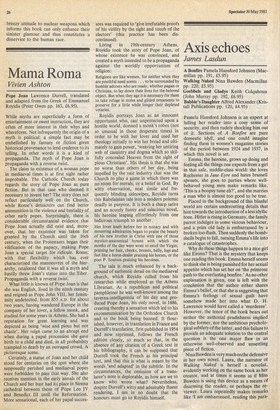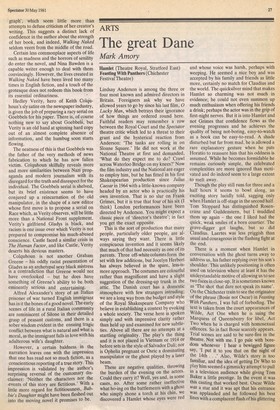Axis echoes
James Lasdun
A Bonfire Pamela Hansford Johnson (Mac.. millan pp. 191, £5.95) Walking Naked Nina Bawden (Macmillan pp. 220, £5.95) Goebbels and Gladys Keith Colquhoun (John Murray pp. 192, £6.95) Babble's Daughter Alfred Alexander (Kristall Publications pp. 120, £4.95) Pamela Hansford Johnson is an expert at lulling her readerinto a cosy sense of security, and then rudely shocking him out of it. Sections of A Bonfire are pure domestic idyll, and one could imagine finding them in women's magazine stories of the period between 1924 and 1937, in which this novel is set.
Emma, the heroine, grows up doing and feeling all the things one expects from a girl in that safe, middle-class world: she loves Rochester in Jane Eyre and hates brussell sprouts, she goes to parties where wellbehaved young men make remarks like, 'This is a boopsy tune eh?', and she marries a man who is almost too good to be true.
Placed in the background of this blissful world are certain undercutting details that hint towards the introduction of a less idyllic tone. Hitler is rising in Germany, the family parrot indulges in some vicious behaviour, and a prim old lady is embarrassed by a broken loo-flush. Then suddenly the bombshells begin to fall, turning Emma's life into a catalogue of catastrophes.
Why do these things happen to a nice girl like Emma? That is the mystery that keeps one reading this book. Emma herself seems to think she is being punished for her sexual appetite which has set her on 'the primrose path to the everlasting bonfire.' As no other explanation is given, one is left with the conclusion that the author either shares Emma's belief, or that she is suggesting that Emma's feelings of sexual guilt have somehow made her into what D. H. Lawrence would have called a 'murderee'. However, the tenor of the book bears out nether the authorial prudishness implied by the former, nor the ambitious psychological subtlety of the latter, and this failure to provide an adequate solution to the central question is the one major flaw in an otherwise well-observed and unsettling piece of fiction.
Nina Bawden is very much onthe defensive in her own novel. Laura, the narrator ot Walking Naked is herself a novelist, evidently working on the same book as her creator, and at times it seems as if Miss Bawden is using this device as a means of disarming the reader, or perhaps the reviewer. Laura repeatedly makes remarks like 'I am embarrassed, reading this para graph', which seem little more than attempts to defuse criticism of her creator's writing. This suggests a distinct lack of confidence in the author about the strength of her book, and indeed, Walking Naked seldom veers from the middle of the road.
Certain less commonplace aspects of life such as madness and the horrors of senility do enter the novel, and Nina Bawden is a capable writer enough to deal with them convincingly. However, the lives created in Walking Naked have been lived too many times in English fiction, and a touch of the grotesque does not redeem this book from its essential ordinariness.
Hedley Verity, hero of Keith Colquhoun's sly satire on the newspaper industry, is given the job of preparing a racy serial on Goebbels for his paper. There is, of course nothing new to say about Goebbeli, but Verity is an old hand at spinning hard copy out of an almost complete absence of information, and the humbug soon starts flowing.
The neatness of this is that Goebbels was the father of the very methods of news fabrication to which he has now fallen victim. Colquhoun skilfully reveals more and more similarities between Nazi propaganda and modern journalism with its disregard for the truth and disrespect for the individual. The Goebbels serial is shelved, but its brief existence seems to have conjured up a reincarnation of the old manipulator, in the shape of a new editor whose first move is to propose a serial on Race which, as Verity observes, will be little more than a National Front supplement. Verity's girlfriend Gladys is black, and racism is one issue over which Verity is not prepared to compromise his much-abused conscience. Castle faced a similar crisis in The Human Factor, and like Castle, Verity deserts his devious masters.
Colquhoun is not another Graham Greene — his oddly racist presentation of Gladys as an archetypal sexy black mistress is a contradiction that Greene would not have overlooked — but he does have something of Greene's ability to be both eminently serious and entertaining.
Alfred Alexander's story of an Italian prisoner of war turned English immigrant has in it the bones of a good novel. The early scenes of life in a rural Italian community are reminiscent of Silone in their detailed grasp of peasant customs, and there is a sober wisdom evident in the ensuing tragic conflict between what is natural and what is moral, as the immigrant falls in love with his adulterous wife's daughter.
However, a certain baldness in the narration leaves one with the impression that one has read not so much fiction, as a conscientious reporting of a true story. This impression is validated by the author's surprising reversal of the customary disclaimer: 'Neither the characters nor the ,events of this story are fictitious.' With a little more regard for fictitiousness, Babbie's Daughter might have been fleshed out into the moving novel it promises to be.











































 Previous page
Previous page